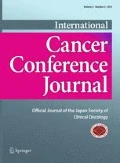Abstract
Imatinib, sunitinib, and regorafenib show high disease control rates for metastatic or unresectable gastrointestinal stromal tumor. However, partial response rates are low, and complete response to regorafenib had not been reported. Our case was an 81-year-old woman who underwent partial gastrectomy for an extremely large high risk gastrointestinal stromal tumor. Adjuvant imatinib caused intolerable adverse effects. One year after the surgery, local recurrence was diagnosed and sunitinib was started. Sunitinib also caused severe adverse effects. However, long-term disease control for 39 months was achieved with adequate dose reduction. After that period, the local recurrence started to grow rapidly, and the patient underwent total gastrectomy and distal pancreatectomy with excisions of nearby seeding nodules. Six months after the second operation, two liver metastasis nodules and one peritoneal metastasis nodule were found. We started regorafenib at standard dose. One month after the start of regorafenib treatment, the dose was reduced as follows: 2 weeks administration of 80 mg per day followed by 2 weeks drug holiday, due to intolerable adverse effects. The evaluation computed tomography and 18F-Fluorodeoxyglucose positron emission tomography could confirm complete response of her liver metastases. Even low dose regorafenib could maintain complete response for 10 months with only mild adverse effect. We report the first case of clinical complete response by regorafenib against liver metastases of gastrointestinal stromal tumor with intolerance to imatinib and refractory to sunitinib.




References
Verweij J, Casali PG, Zalcberg J et al (2004) Progression-free survival in gastrointestinal stromal tumours with high-dose imatinib: randomised trial. Lancet 364:1127–1134
Demetri GD, van Oosterom AT, Garrett CR et al (2006) Efficacy and safety of sunitinib in patients with advanced gastrointestinal stromal tumour after failure of imatinib: a randomised controlled trial. Lancet 368:1329–1338
Demetri GD, Reichardt P, Kang YK et al (2013) Efficacy and safety of regorafenib for advanced gastrointestinal stromal tumours after failure of imatinib and sunitinib (GRID): an international, multicentre, randomised, placebo-controlled, phase 3 trial. Lancet 381:295–302
Blanke CD, Demetri GD, von Mehren M et al (2008) Long-term results from a randomized phase II trial of standard- versus higher-dose imatinib mesylate for patients with unresectable or metastatic gastrointestinal stromal tumors expressing KIT. J Clin Oncol 26:620–625
Chen YY, Yeh CN, Cheng CT et al (2011) Sunitinib for Taiwanese patients with gastrointestinal stromal tumor after imatinib treatment failure or intolerance. World J Gastroenterol 17:2113–2119
Rule SA, O’Brien SG, Crossman LC (2012) Managing cutaneous reactions to imatinib therapy. Blood 100:3434–3435
Deininger MW, O’Brien SG, Ford JM et al (2003) Practical management of patients with chronic myeloid leukemia receiving imatinib. J Clin Oncol 21:1637–1647
Wilhelm SM, Dumas J, Adnane L et al (2011) Regorafenib (BAY 73-4506): a new oral multikinase inhibitor of angiogenic, stromal and oncogenic receptor tyrosine kinases with potent preclinical antitumor activity. Int J Cancer 129:245–255
Antonescu CR, Besmer P, Guo T et al (2005) Acquired resistance to imatinib in gastrointestinal stromal tumor occurs through secondary gene mutation. Clin Cancer Res 11:4182–4190
Heinrich MC, Maki RG, Corless CL et al (2008) Primary and secondary kinase genotypes correlate with the biological and clinical activity of sunitinib in imatinib-resistant gastrointestinal stromal tumor. J Clin Oncol 26:5352–5359
Guo T, Hajdu M, Agaram NP et al (2009) Mechanisms of sunitinib resistance in gastrointestinal stromal tumors harboring KITAY502-3ins mutation: an in vitro mutagenesis screen for drug resistance. Clin Cancer Res 15:6862–6870
Agaram NP, Wong GC, Guo T et al (2008) Novel V600E BRAF mutations in imatinib-naive and imatinib-resistant gastrointestinal stromal tumors. Genes Chromosomes Cancer 47:853–859
Heinrich MC, Marino-Enriquez A, Presnell A et al (2012) Sorafenib inhibits many kinase mutations associated with drug-resistant gastrointestinal stromal tumors. Mol Cancer Ther 11:1770–1780
Deininger M, Buchdunger E, Druker BJ (2005) The development of imatinib as a therapeutic agent for chronic myeloid leukemia. Blood 105:2640–2653
Strumberg D, Scheulen ME, Schultheis B et al (2012) Regorafenib (BAY 73-4506) in advanced colorectal cancer: a phase I study. Br J Cancer 106:1722–1727
Acknowledgments
The authors thank Dr. Tobioka, Department of pathological diagnosis, Otaru Kyokai Hospital for evaluating histopathological findings.
Conflict of interest
All of the authors, except one, declare that they have no conflict of interest. One (Yasushi Tsuji) has received lecture fees from Ono Pharmaceutical Co., Ltd.
Author information
Authors and Affiliations
Corresponding author
About this article
Cite this article
Kitayama, H., Hirayama, M., Sugiyama, J. et al. Complete response of gastrointestinal stromal tumor liver metastases to regorafenib. Int Canc Conf J 4, 167–171 (2015). https://doi.org/10.1007/s13691-014-0192-4
Received:
Accepted:
Published:
Issue Date:
DOI: https://doi.org/10.1007/s13691-014-0192-4

